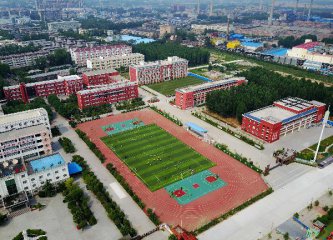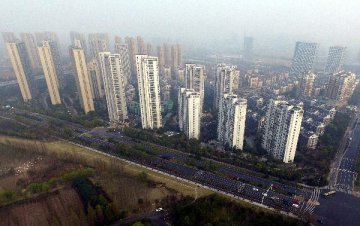
China's move to boost rental housing supply aims to provide a long-term solution for an overheated real estate market, analysts said.
China will launch pilot programs in 13 major cities, including Beijing, Shanghai and Guangzhou, to build rental housing on rural land, authorities said Monday.
Many projects will be finished by end of 2021, before expansion elsewhere.
Rural collective economic organizations can build and rent housing on rural land themselves or through joint ventures, according to the Ministry of Land and Resources (MLR) and the Ministry of Housing and Urban-Rural Development.
The move is an attempt to increase rental options and establish a housing system that is fair to both owners and tenants, analysts said.
For a long time, soaring property prices have put city dwellers under pressure, making housing affordability a growing problem for policy makers, prompting them to further tap the rental market to stabilize prices and curb speculation.
An unnamed MLR official said the move was in line with the central authorities' comments made at the Central Economic Work Conference in December that "houses are built to be inhabited, not for speculation."
"The mentality of China's real estate regulation has changed from a short-term to a long-term one," said Kang Junliang with China Real Estate Association.
Long-term measures include a national property and land registration system, market-oriented renting measures and a classified land supply regulation mechanism, according to Kang.
China has recently taken a set of measures to stabilize the housing market and curb speculation.
On July 17, authorities in the southern city of Guangzhou decided to give tenants and homeowners equal rights to local education resources. In many Chinese cities, the right to attend schools is limited to the children of homeowners rather than tenants. Guangzhou is the first top-tier Chinese city to grant such rights to tenants.
On July 20, a notice was issued by the Ministry of Housing and Urban-Rural Development and other government departments saying that measures would be taken in cities with net population inflows, including increasing rental housing supply and setting up a government-backed home rental service platform.
On Aug. 4, Beijing municipal government published a document to solicit public opinions, which said individual buyers would be able to buy a share of a house but still have the full "right of use."
Chen Zhi, secretary general of Beijing real estate association, said the new homes were part of the city's long-term housing controls, making the system fairer by allowing more people to buy their own homes.
The policy has several restrictions on buyers. Buyers and their families cannot already own homes in their name. Single people making purchases must be at least 30 years old. And a family can only apply for one home.
"The new housing policy clearly targets households that have difficulties in purchasing a home," said Liu Weimin, researcher with the State Council development research center.
Deng Liang, a Beijing-based lawyer, said the new homes could better satisfy housing demand while curbing speculation.
The country will establish a market-oriented and long-term mechanism that can curb real estate bubbles and prevent erratic fluctuations, according to the statement issued after the Central Economic Work Conference.
The government will use land, investment, lawmaking, fiscal and taxation and financial instruments in order to achieve its aim.
China's property market has shown signs of cooling as prices have faltered in major cities amid tough government curbs.
























Latest comments